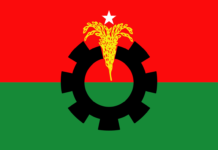Faruque Ahmed
The government has at least one cabinet minister who is pro-national austerity and believes in politics of productivity and castigated the annual Haj and Tablig jamaat as unproductive and wasteful.
At a meeting in New York, Minister of Telecommunications Abdul Latif Siddique, who accompanied the Prime Minister last week at UN General Assembly meeting said he was more against Hajj and Tabligh Jamaat than the Jamaat-e-Islami.
This is because it is a total waste of manpower. Those who perform Hajj do not have any productivity. They deduct from the economy and spend the money abroad for this un-productive purpose. He said if one lakh people perform Hajj every year and spend Tk 5 lakh each, which comes to Tk 500 crore in wasteful expenditure.
Govt. trying to dodge the issue?
He further said Prophet Muhammad who launched the new religion was worried about the livelihood of his Arabian people as they were robbers. He then asked his followers to meet at a place annually keeping in mind that it will generate income for their livelihood. This is Haj, he said.
Likewise, he said, Tabligh Jamaat brings together about 20 lakh people every year without any specific duties, except creating traffic congestions. Latif Siddique made similar derogatory comments on Prime Minister’s son Sajib Wazed questioning his role in the government.
He demeaned participants at TV talk shows and described them as something in unprintable word and who have nothing else to do. Siddique also snubbed a journalist when he posed a question, shooting back at him: “Why have you come here? Who has invited you here?”
His tasteless comments and tirade against the Prophet of Islam made the entire nation angry. Even the ruling party men at all levels have been caught by surprise with the minister’s slanderous comment on religious matters; although he is used to making such stinky and horrendous comments very frequently. But this time he seemed to have crossed all limits.
In the face of a nationwide protest against the minister’s spiteful remarks on Haj, senior ruling party leaders said the minister would be dropped from the cabinet and may even from the party.
But the lack of prompt action from the party leaders to allay nationwide protests prompted the major opposition BNP and Islamic groups to accuse the government for working to cover it up and bypass the issue. The opposition made no secret that it is planning more protests if the government attempts to save the minister’s cabinet berth. But indications suggest that the country may become volatile again after the Eid-ul-Azha as the minister has vowed not to resign or apologise.
Priority lacking
A new tension in politics emerged as the 20 party opposition alliance is taking preparation to take to the street soon demanding free fair election under a care taker government. Politics may turn volatile this time when Prime Minister Sheikh Hasina is demanding peace and stability to give her government enough space to implement big infrastructure projects to bring prosperity to the people.
But instead of reigning in the errant ministers, even on previous occasions, the Prime Minister had warned BNP chairperson Begum Khaleda Zia to refrain from creating new volatility in the name of fresh election. Critics wonder when her own cabinet ministers are adding new volatile issue in politics, how she could get her desired stability for growth.
It appears that the month of September came this year with the high hope of massive Japanese investment into Bangladesh. The Prime Minister of Japan Shinzo Abe visited Dhaka with a big delegation of Japanese investors who are eyeing relocation of their industries here reducing concentration in China.
But no sooner had the Japanese investment delegation returned home, Bangladesh saw three days of consecutive shutdowns. Jamaat-E-Islami enforced the first two days shutdown to protest imprisonment unto death of its leader Maulana Delwar Hussain Sayeede claiming that the Supreme Court verdict commuting his death sentence was based on frame up cases. Critics say the government could avoid the volatility if it had decided to prioritise the development issues.
BNP enforced the third day shutdown to protest cabinet approval to new amendment to the constitution aimed at handing over power of impeachment of Supreme Court Judges to Parliament. This could have been avoided if it had it priority right, analysts say. The opposition blamed the government to take the higher judiciary hostage which is now in absolute control to deny any space to the opposition.
Political volatility looming large
The month of October and November is coming again with the gloomy forecast of prolonged political agitation after the Eid-Ul-Azha festival to force the government to announce date for fresh election.
The government won the January 5 election with 154 MPs winning unopposed and faced it with the legitimacy question. The government had promised it would hold a free and fair election soon after Jan 5 polls to end the legitimacy question. But now it feels more confident of its hold on power and made clear repeatedly in recent statements that it has no intention to hold new election.
Contrary to it, the government is tightening its rope on BNP leaders as almost all its front ranking leaders including standing committee members and party Secretary General are now facing criminal charges on ridiculous grounds are on the run. Charges against them are like setting fire on public transports in the streets during agitation before the January 5 election.
BNP chairperson Begum Zia is also facing trial on charges of ‘misappropriation of fund’ of Zia Charitable Trusts and Zia Orphanage Trust.
The Prime Minister is out to deny new election justifying that peace and stability is essential at the moment to implement big infrastructure projects to improve the country’s economic development. But in doing so she is trying to ignore the fact that peace and stability has its roots in democratic foundation of the state. Uninterrupted development is not enough to continue in power unless the government is properly elected and accepted at home and abroad.
Meanwhile, the government is trying to put up a brave face overseas despite the legitimacy question around the January 5 election. It claims it is in firm control of the country’s politics and as such there is no need for any fresh election.
Source: Weekly Holiday









